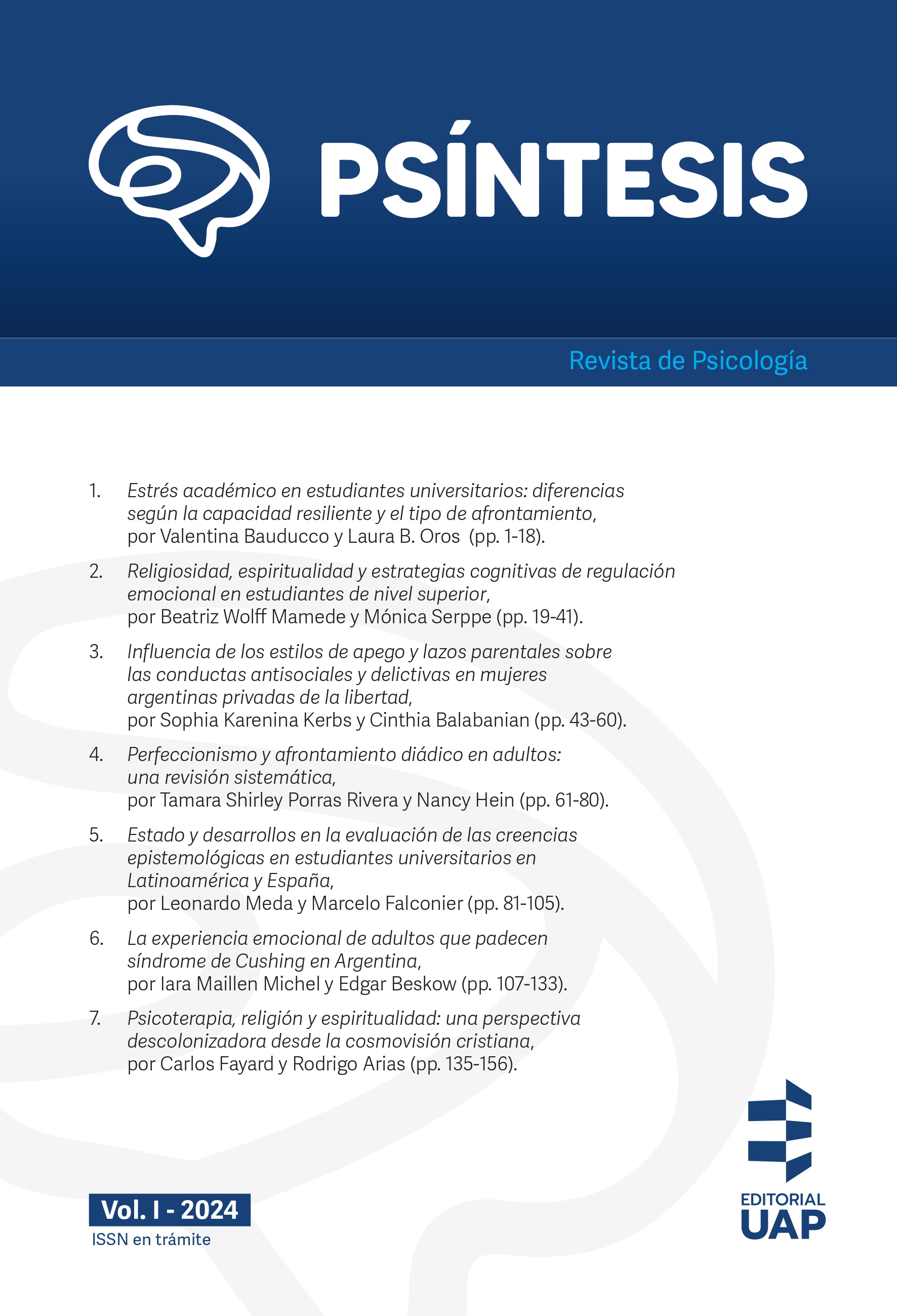Academic stress in university students: Differences according to resilience and coping strategies
DOI:
https://doi.org/10.56487/rf6pb235Keywords:
Academic stress — Resilience — Coping strategies — University studentsAbstract
The objective of this study was to analyze whether there are significant differences
in the experience of academic stress according to the resilient capacity and the type
of coping presented by university students. The sample consisted of 200 university
students, women and men residing in Argentina, who were studying from the first
to the seventh year of study in different careers. The students were selected through
a non-probabilistic convenience sampling. A Sociodemographic Questionnaire, the
Wagnild and Young Resilience Scale, the Argentine Adaptation of the Moos Coping
Response Inventory (CRI-A) for adults, adapted by Mikulic, and the SISCO Macías Academic Stress Inventory were administered. Descriptive analyses were initially
carried out. Subsequently, two factorial MANOVAs (Scheffé multivariate analysis
of variance with post hoc contrasts) were used. In the first, resilience factors were
introduced as independent variables, and in the second, coping factors. In turn, the
main results found were that there are no statistically significant differences in experiencing academic stress based on the dimensions of “flexibility and dynamism,”
and “self-confidence and independence.” However, it was possible to identify a trend
towards significance in the “perseverance and sense of achievement” dimension.
On the other hand, academic stress scores decrease as the values of the approach strategy increase, and they rise as avoidance increases. In conclusion, the functional resolution of problems would be a protective factor for academic stress. In contrast, the tendency to avoid problem-solving would be a risk factor for the perception of stress
in university students. On the other hand, the capacity for perseverance and sense of
achievement could become a stress buffer, to be tested in future studies.
Downloads
References
Acuña, V. R., Palma, C. D. C. J., Méndez, H. A. M., Arceo, M. D. L. Á. C., Castillo, M. M. y Barra, A. V. (2014). Frecuencia e intensidad del estrés en estudiantes de Licenciatura en Enfermería de la DACS. Horizonte Sanitario, 13(1), 162-169. https://doi.org/10.19136/hs.a13n1.59
Águila, B. A., Calcines, M., Monteagudo, R. y Nieves, Z. (2015). Estrés académico. Edumecentro, 7(2), 163-178. https://dialnet.unirioja.es/servlet/ articulo?codigo=5023824
Arrogante, O., Pérez, A. M. y Aparicio, E. G. (2015). Bienestar psicológico en enfermería: relaciones con resiliencia y afrontamiento. Enfermería Clínica, 25(2), 73-80. https://doi.org/10.1016/j.enfcli.2014.12.009
Awé, C., Gaither, C. A., Crawford, S. Y. y Tieman, J. (2016). A comparative analysis of perceptions of pharmacy students’ stress and stressors across two multicampus universities. American Journal of Pharmaceutical Education, 80(5), art. 82. https://doi.org/10.5688/ajpe80582
Bauducco, V. (2022). Estrés académico en estudiantes universitarios: diferencias según la capacidad resiliente y el tipo de afrontamiento [Tesis de grado, Universidad Adventista del Plata].
Becoña, E. (2006). Resiliencia: definición, características y utilidad del concepto. Psicothema, 11(3), 125-146. http://e-spacio.uned.es/fez/eserv/bibliuned:Psicopat- 2006-E3EEEFE3-E4DF-43B4-C15D-FF038F693092/Documento.pdf
Carver, C. S., Scheier, M. F. y Weintraub, J. K. (1989). Assessing coping strategies: A theoretically based approach. Journal of Personality and Social Psychology, 56(2), 267-283. https://doi.org/10.1037/0022-3514.56.2.267
Domingues, H. C., Barlem, E. L. D., Almeida, L. K. D., Tomaschewski Barlem, J. G., Lunardi, V. L. y Ramos, A. M. (2018). Stress triggers in the educational environment from the perspective of nursing students. Texto & Contexto - Enfermagem, 27(1). https://doi.org/10.1590/0104-07072018000370014
Escobar Zurita, E. R., Soria de Mesa, B. W., López Proaño, G. F. y Peñafiel Salazar, D. A.(2018). Manejo del estrés académico: revisión crítica. Atlante Cuadernos de Educación y Desarrollo. https://www.eumed.net/rev/atlante/index.htmll
Galarza, A., Martínez, F., Valeria S., Posada, M. y Castañeiras, C. (2019). Resiliencia y afrontamiento adaptativo: ¿recursos claves para la salud mental? En II Congreso Internacional de Investigación. Facultad de Psicología, Universidad Nacional de La Plata. https://www.memoria.fahce.unlp.edu.ar/trab_eventos/ev.11984/ ev.11984.pdf
Grotberg, E. H. (1995). A guide to promoting resilience in children: Strengthening the human spirit. Medicine & Social, 19(2), 37-48. https://eric.ed.gov/?id=ED386271
Lazarus, R. S. (2000). Estrés y emoción: manejo e implicaciones en nuestra salud. Desclée de Brouwer.
Lazarus, R. S. y Folkman, S. (1986). Estrés y procesos cognitivos. Ediciones Martínez Roca.
Lemos, V., Krumm, G., Gutiérrez, M. y Filippetti, V. (2016). Desarrollo de una escala para evaluar recursos de personalidad asociados a la resiliencia infantil. Acción Psicológica, 13(2), 101-116. https://dx.doi.org/10.5944/ap.13.2.17821
Macías, B. (2006). Un modelo conceptual para el estudio del estrés académico. Revista Electrónica de Psicología Iztacala, 9(3), 110-129. https://www.iztacala.unam.mx/carreras/psicologia/psiclin/vol9num3/art6vol9no3.pdf (2007). El inventario SISCO del estrés académico. Investigación Educativa Duranguense, (7), 90-93. https://dialnet.unirioja.es/metricas/documentos/ ARTREV/2358921
Mikulic, I. M. (1998). Ecoevaluación psicológica del exdelincuente en su ambiente natural [Tesis doctoral no publicada]. Universidad de Belgrano.
Mikulic, I. M. y Crespi, M. C. (2008). Adaptación y validación del inventario de respuestas de afrontamiento de Moos (CRI-A) para adultos. Anuario de Investigaciones, (15), 5-2008, 305-312.
Moos, R. (1993). Coping responses inventory. Psychological Assessment Resources.
Monzón Martín, I. (2007). Estrés académico en estudiantes universitarios. Apuntes de Psicología, 25(1), 87-99.
Muñoz Villena, A. J. (2015). Perseverancia y perfeccionismo percibido en estudiantes adolescentes: influencias sobre la percepción de estrés [Tesis de maestría, Universidad Internacional de La Rioja]. https://reunir.unir.net/handle/123456789/3446
Ortega Quinteros, E. G., Palacios Corrales, M. V. y Chávez Alania, M. I. (2016). Estrategias de afrontamiento frente al estrés académico que utilizan los estudiantes de una academia preuniversitaria de Lima Metropolitana [Tesis de licenciatura, Universidad Peruana Cayetano Heredia]. https://hdl.handle.net/20.500.12866/100
Restrepo, J. E., Sánchez, O. A. y Castañeda Quirama, T. (2020). Estrés académico en estudiantes universitarios. Psicoespacios, 14(24), 17-37. https://doi.org/10.25057/21452776.1331
Richaud, M. C. (2006). Evaluación del afrontamiento en niños de 8 a 12 años. Revista Mexicana de Psicología, 23(2), 193-201. https://www.redalyc.org/pdf/2430/243020649005.pdf (2013). Contributions to the study and promotion of resilience in socially vulnerable children. American Psychologist, 68(8), 751-758. http://dx.doi.org/10.1037/a0034327
Silva-Ramos, M. F., López-Cocotle, J. J. y Columba Meza-Zamora, M. E. (2020). Estrés académico en estudiantes universitarios. Investigación y Ciencia, 28(79), 75-83. https://dialnet.unirioja.es/servlet/articulo?codigo=7689029
Steinhardt, M. A. y Dolbier, C. L. (2008). Evaluación de una intervención de resiliencia para mejorar las estrategias de afrontamiento y los factores protectores y disminuir la sintomatología. Revista de Salud Universitaria Estadounidense, 56, 445-453. http://userpage.fu-berlin.de/~gesund/publicat/copchap6.htm
Taboada, C. F., Cabanach, R. G. y Gestalt, A. J. S. (2019). Perfiles motivacionales a metas y manejo de estrategias de afrontamiento de estrés en estudiantes universitarios. European Journal of Child Development, Education and Psychopathology, 7(2),235-246.
Wagnild, G. M. y Young, H. M. (1993). Development and psychometric evaluation of the resilience scale. Journal of Nursing Measurement, 1(2), 165-178.
Downloads
Published
Issue
Section
License
Copyright (c) 2024 Psíntesis

This work is licensed under a Creative Commons Attribution-NonCommercial-ShareAlike 4.0 International License.





